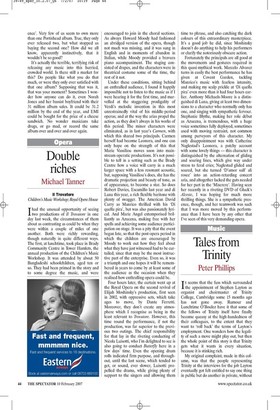Double riches
Michael Tanner II Trovatore Children's Music Workshop; Royal Opera House Ihad the unusual opportunity of seeing two productions of R Trovatore in one day last week, the circumstances of them about as contrasting as could be when they were within a couple of miles of one another. Both were richly rewarding, though naturally in quite different ways. The first, at lunchtime, took place in Brady Community Centre in Tower Hamlets, the annual production of the Children's Music Workshop. It was attended by about 50 Bangladeshi schoolchildren, aged ten or so. They had been primed in the story and to some degree the music, and were encouraged to join in the choral sections. As always Howard Moody had fashioned an abridged version of the opera, though not much was missing, and it was sung in English and in moments of abandon in Italian, while Moody provided a bravura piano accompaniment. The staging consisted of drapes, and the characters were in theatrical costume some of the time, the rest of it not.
Under these conditions, sitting behind an enthralled audience, I found it happily impossible not to listen to the music as if I were hearing it for the first time, and marvelled at the staggering prodigality of Verdi's melodic invention in this most unrestrainedly vital of his middle-period operas; and at the way the arias propel the action, as they don't always in his works of this period. The minor characters were eliminated, as in last year's Carmen, with which this shared two principals. Carmen herself had become Leonora, and one can only hope on the strength of this that Marie Vassiliou moves soon into mainstream operatic productions. It's not possible to tell in a setting such as the Brady Centre how a voice will carry in a much larger space with a less resonant acoustic, but, supposing Vassiliou's does, she has the dramatic projection and beauty of tone, as of appearance, to become a star. So does Robert Davies, Escamillo last year and di Luna this year, a rich flexible baritone with plenty of swagger. The American David Curry as Manrico thrilled with his 'Di quella pira', but was also passionately lyrical. And Marie Angel extemporised brilliantly as Azucena, making free with her spells and achieving some audience participation on stage. It was a pity that the event began late, so that the post-opera period in which the children are encouraged by Moody to work out how they feel about what they have just witnessed had to be curtailed, since that may be the most instructive part of the enterprise. Even so, it was a triumph and one hopes it will be remembered in years to come by at least some of the audience as the occasion when they realised how enthralling opera could be.
Four hours later, the curtain went up at the Royal Opera on the second revival of Elijah Moshinsky's production, first seen in 2002, with oppressive sets, which take ages to move, by Dante Ferretti. Moreover, they don't create any atmosphere which I recognise as being in the least relevant to Trovatore. However, this time round the performance, if not the production, was far superior to the previous two outings. The chief responsibility for that lay in the riveting conducting of Nicola Luisotti, who I'm delighted to see is also going to conduct Butterfly here in a few days' time. Even the opening drum rolls indicated firm purpose, and throughout, until the last scene, which tended to get, or sound, ever slower, Luisotti propelled the drama, while giving plenty of support to the singers and allowing them time to phrase, and also catching the dark colours of this extraordinary masterpiece. It's a good job he did, since Moshinsky doesn't do anything to help his performers or clarify the notoriously obscure action.
Fortunately the principals are all good at the movements and gestures required in this quasi-mythical work. Marcelo Alvarez turns in easily the best performance he has given at Covent Garden, tackling Manrico's music with fearless intensity, and making my scalp prickle at 'Di quella pira' even more than it had four hours earlier. Anthony Michaels-Moore is a distinguished di Luna, giving at least two dimensions to a character who normally only has one, and singing with sympathetic fervour. Stephanie Blythe, making her role debut as Azucena, is tremendous, with a huge voice sometimes fully deployed, sometimes used with moving restraint, not common among purveyors of this character. My only disappointment was with Catherine Naglestad's Leonora, a patchy account with some lovely things — this character is distinguished by the alternation of gliding and soaring lines, which give way under stress to feral cries; Naglestad glided and soared, but she turned D'amor sull' ali rosee' into an action-retarding concert aria, and altogether lacked the guts needed for her part in the `Miserere'. Having seen her recently in a riveting DVD of Gluck's Alceste, I was hoping for much more thrilling things. She is a sympathetic presence, though, and her teamwork was such that I was more moved by this performance than I have been by any other that I've seen of this very demanding opera.













































 Previous page
Previous page